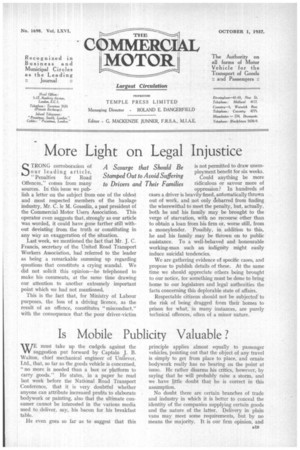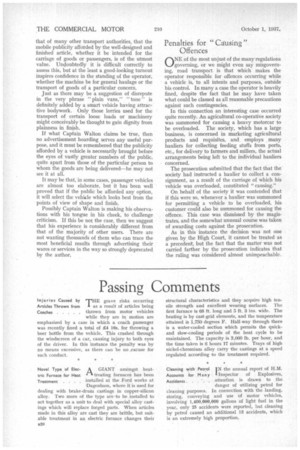Is Mobile Publicity Valuable ?
Page 29

Page 30

If you've noticed an error in this article please click here to report it so we can fix it.
WE must take up the cudgels against the suggestion put forward by Captain J. B. Walton, chief mechanical engineer of Unilever, Ltd., that, so far as the goods vehicle is concerned, "no more is needed than a box or platform to carry goods." He states, in a paper he read last week before the National Road Transport Conference, that it is very doubtful whether anyone can attribute increased profits to elaborate bodywork or painting, also that the ultimate consumer cannot be interested in the various media used to deliver, say, his bacon for his breakfast table.
He even goes so far as to suggest that this principle applies almost equally to passenger vehicles, pointing out that the object of any travel is simply to get from place to place, and ornate bodywork really has no bearing on the point at issue. He rather disarms his critics, however, by saying that he will probably raise a storm, and we have little doubt that he is correct in this assumption.
No doubt there are certain branches of trade and industry in which it is better to conceal the identity of the companies supplying certain goods and the nature of the latter. Delivery in plain vans may meet some requirements, but by no means the majority. It is our firm opinion, and that of many other transport authorities, that the mobile publicity afforded by the well-designed and finished article, whether it be intended for the carriage of goods or passengers, is of the utmost value. Undoubtedly it is difficult correctly to assess this, but at the least a good-looking turnout inspires confidence in the standing of the operator, whether the machine be for general haulage or the transport of goods of a particular concern.
Just as there may be a suggestion of disrepute in the very phrase "plain vans," "tone " is definitely added by a smart vehicle having attractive bodywork. Only those lorries used for the transport of certain loose loads or machinery might conceivably be thought to gain dignity from plainness in finish.
If what Captain Walton claims be true, then no advertisement hoarding serves any useful purpose, and it must be remembered that the publicity afforded by a vehicle is necessarily brought before the eyes of vastly greater numbers of the public, quite apart from those of the particular person to whom the goods are being delivered—he may not see it at all.
It may be that, in some cases, passenger vehicles are almost too elaborate, but it has been well proved that if the public be afforded any option, it will select the vehicle which looks best from the points of view of shape and finish.
Possibly Captain Walton is making his observations with his tongue in his cheek, to challenge criticism. If this be not the case, then we suggest that his experience is considerably different from that of the majority of other users. There are not wanting thousands of them who can trace the most beneficial results through advertising their wares or services in the way so strongly deprecated by the author.
Penalties for " Causing " Offences
("NNE of the most unjust of the many regulations O or we might even say misgoverning, road transport is that which makes the operator responsible for offences occurring while a vehicle is, to all intents and purposes, outside his control. In many a case the operator is heavily fined, despite the fact that he may have taken what could be classed as all reasonable precautions against such contingencies.
In this connection an interesting case occurred quite recently. An agricultural co-operative society was summoned for causing a heavy motorcar to be overloaded. The society, which has a large business, is concerned in marketing agricultural products and requisites, and employs many hauliers for collecting feeding stuffs from ports, etc., for delivery to farmers and millers, the actual arrangements being left to the individual hauliers concerned.
The prosecution submitted that the fact that the society had instructed a haulier to collect a consignment, as a result of the carriage of which his vehicle was overloaded, constituted "causing."
On behalf of the society it was contended that if this were so, whenever a haulier was summoned for permitting a vehicle to be overloaded, his customer could also be summoned for causing the offence. This case was dismissed by the magistrates, and the somewhat unusual course was taken of awarding costs against the prosecution.
As in this instance the decision was not one given by the High Court, it cannot be treated as a precedent, but the fact that the matter was not carried farther by the prosecution indicates that the ruling was considered almost unimpeachable.




















































































